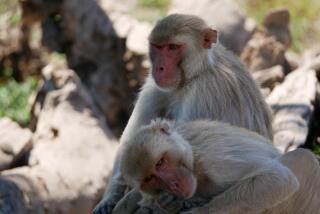Solitary living, infanticide linked to origin of monogamy in mammals
Itâs one of the most vexing questions in modern science: Why are some species monogamous? Two research teams using similar research methods came up with different answers in a pair of studies published Monday.
One study, appearing in Science, argued that monogamy evolved as a practical solution for males because females lived far apart from one another. The other, in Proceedings of the National Academy of Sciences, makes the case that males embraced monogamy to protect their offspring from rival males, who might see the youngsters as obstacles to mating with females.
Social monogamy is the exclusive pairing of males and females who live and breed together and raise their offspring as a unit. Itâs common in birds but rarer in mammals, with only 9% of mammal species examined in the Science paper classified as monogamous. (Among primates, the group that includes humans, 29% of species are monogamous.) Alternatives to monogamy, such as polygyny (one male mating with multiple females) allow males to spread their genes more widely; other systems built around group living and multiple matings allow for protection from predators.
Scientists have three leading theories to explain the appeal of monogamy. One is that by taking on some parenting responsibility, males help ensure the survival of their offspring. Another is that it evolved as a mate-guarding strategy among males who couldnât guard multiple females that lived far apart from one another. The third contender is the idea that monogamy was a defense against infanticide.
Neither research group had access to a time machine to allow them to return to the early days of monogamy to see what was going on. Instead, they took a close look at the living arrangements of thousands of mammals alive today and used mathematical modeling to infer the most likely chain of events that led to them.
Dieter Lukas and coauthor Tim Clutton-Brock, both evolutionary biologists at the University of Cambridge in England, attacked the problem by categorizing the mating systems of 2,545 species on the mammal family tree. They discovered 61 cases where a species switched to monogamy, and in 60 of those the speciesâ ancestor lived a solitary life. That supported the idea that these species may have shifted to monogamy as females established their own exclusive territory, perhaps to secure enough food for themselves and their offspring, they wrote in the journal Science.
Although Lukas and Clutton-Brock found that monogamy was associated with fatherly behavior, paternal care usually appeared on the family tree following the emergence of monogamy, meaning it was an effect, not a cause. Besides, there are many species that are monogamous but donât rely on fathers to care for offspring, they added.
Although the pair found that infanticide was less common in monogamous species, they found no evidence that its appearance or disappearance in mammals had anything to do with the presence or absence of monogamy.
Kit Opie, a biological anthropologist at University College in London, led a team that confined its work to primates and came to a different conclusion. In their analysis, which was published in PNAS, reducing infanticide was the only explanation for monogamy that held up.
Monogamous primates had ancestors who committed infanticide, they wrote. Opieâs team did find correlations between monogamy and both fatherly behavior and increasingly isolated females, but in both cases these traits came after the advent of monogamy, not before, their models showed. The increase in dad time also allowed females to reduce the time spent nursing, allowing them to reproduce faster.
Clutton-Brock said he was eager to meet with Opieâs team to see whether they could reconcile their two studies and âtry and sort out the origin of the differences between us.â
Return to Science Now.
Follow on Twitter: @BradBalukjian






